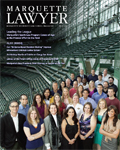Abby Ramirez wants other people to come to – and act on — the same beliefs she has: That a large majority of low-income children can become high-performing students and that the number of schools where such success is widespread can be increased sharply in Milwaukee.
In an “On the Issues” session with Mike Gousha at Eckstein Hall on Tuesday, Ramirez described the work of Schools That Can Milwaukee, a year-old organization that has the goal of increasing the number of students in high-performing schools to 20,000 (more than twice the current total) by 2020. Ramirez is executive director of the organization.
“If you haven’t seen a high-performing school, go visit one because it will change your belief in what’s possible,” she told about 150 people at the session hosted by Gousha, the Law School’s distinguished fellow in law and public policy. She said you can tell in such a visit that the program is different – more energetic, more focused, more committed to meeting ambitious goals – than in schools where there is an underlying belief that the students aren’t going to do well because of factors such as poverty.
“Expectations are huge” as a factor in putting a school on the path to high levels of success, she said. She also said the leadership of the school is a crucial factor.
 The Fall 2011 issue of the Marquette Lawyer arrived this week. The articles can be downloaded here. Highlights include articles on:
The Fall 2011 issue of the Marquette Lawyer arrived this week. The articles can be downloaded here. Highlights include articles on: